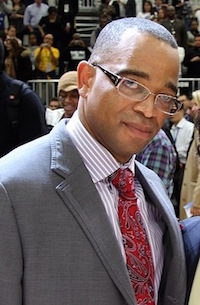By Nathan Janick
Staff Writer
The greatest sports plays of all times aren’t replayed in our minds in silence; they all have a voice along with them.
“THE BAND IS OUT ON THE FIELD.”
“THE GIANTS WON THE PENNANT THE GIANTS WON THE PENNANT THE GIANTS WON THE PENNANT.”
“I DON’T BELIEVE WHAT I JUST SAW.”
“DO YOU BELIVE IN MIRACLES? YES.”
I wasn’t alive for any of these sports moments, but no replay of these highlights is without one of these calls. The plays themselves have become synonymous with the voices of the great commentators that went along with them.
Cancer plagued longtime sports commentator Stuart Scott over the past seven years, and in its third attempt, took his life yesterday. He was 49.
For my generation, Scott was the voice and anchor of ESPN’s SportsCenter. It was his voice I remember hearing when I watched SportsCenter in the mornings before school and on weekends. The young sports fans of my generation can all remember watching hours and hours of SportsCenter. The catch phrases “boo-yow” and “as cool as the other side of the pillow” were announced in backyards and driveways across America as though SportsCenter was airing the action itself.
In a world in which pictures and video are replacing the spoken word at an exponential rate, the true uniqueness and ability of Scott are shown as his voice is more memorable than the highlights it retold.
The lives he touched extended much further than kids watching countless hours of SportsCenter. Tears have filled the eyes of news anchors and sports writers across all the networks as they have recounted their best Scott memories. ESPN gave a touching 15-minute tribute to him. The sporting world as a whole choked up at the thought of Scott. From President Obama giving a heartfelt statement, to every major sporting event on Sunday remembering Scott with a moment of silence, to countless athletes and coaches talking about what Scott meant to them, to SportsCenter turning into a 90-minute Stuart Scott tribute, no one was left untouched by grief and nostalgia.
The pioneers of all arts are met with criticism and adversity. Scott’s words and phrases were described as too “hip-hop” in the white-dominated field, according to ESPN’s Andy Katz. Nonetheless, Scott didn’t change. Replacing proper English with his own signature slang, Scott’s commentary as an anchor and his style as a reporter created diversity in the ways in which sports are covered. Black athletes, coaches and fans have described how refreshing it was to hear language with which they were familiar when they turned on ESPN.
Over time, Scott’s popularity continued to grow. His role as an anchor expanded as he hosted shows at the NBA finals, the Super Bowl and many other major sporting events. He also conducted high profile interviews including ones with Michael Jordan, Tiger Woods, Bill Clinton and Barack Obama.
This past July at the ESPYS, Scott gave a touching speech. As I was watching it, I keep seeing flashes to college basketball coach and later broadcaster Jim Valvano’s speech at the ESPYS 21 years earlier. The first time I saw the speech was in my sixth grade math class, and I believe to this day that it is the most inspiring speech of all time.
Scott was receiving the Jimmy V Award for Perseverance, which was named after Valvano himself. Hiswords left many, including myself, inspired and with tears in our eyes, and they echo in my ears to this day: “When you die, it does not mean that you lose to cancer. You beat cancer by how you live, why you live, and in the manner in which you live.” Like Valvano, Scott passed away only months after his speech.
Although I never met Scott, I felt like I knew him as an old friend. He made us all laugh and made watching highlights after the big game a real experience, whether we watched the actual competition or not. Watching all of these tributes to Scott takes me back to my childhood and to the development of my love for sports. Without SportsCenter and its most recognizable voice, I wouldn’t have grown up quite the same. For me, Scott will never be forgotten. For me, Scott beat cancer.
— By Nathan Janick, Staff Writer

